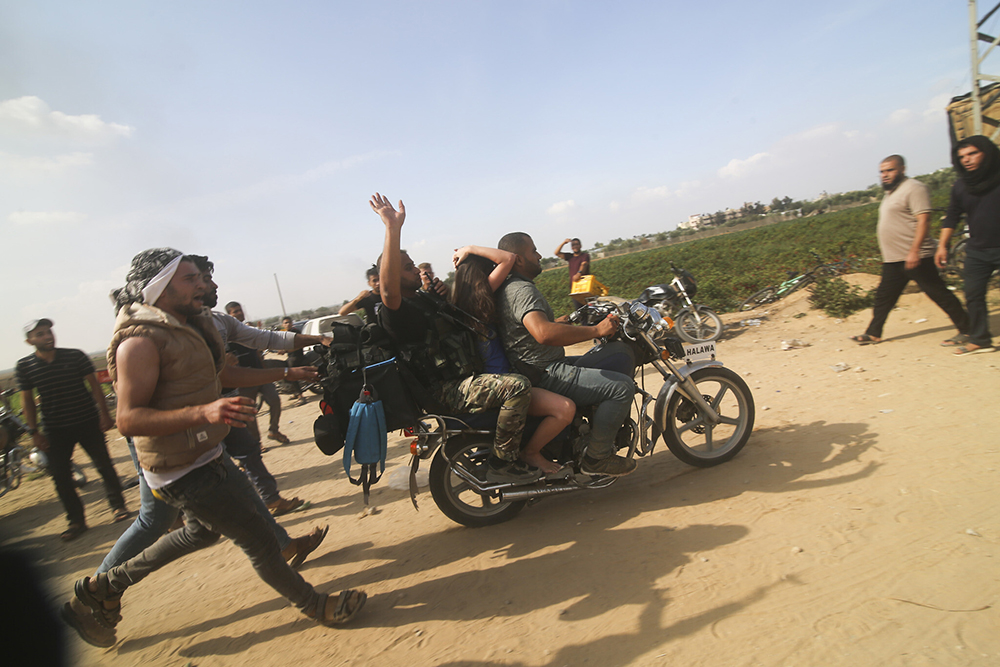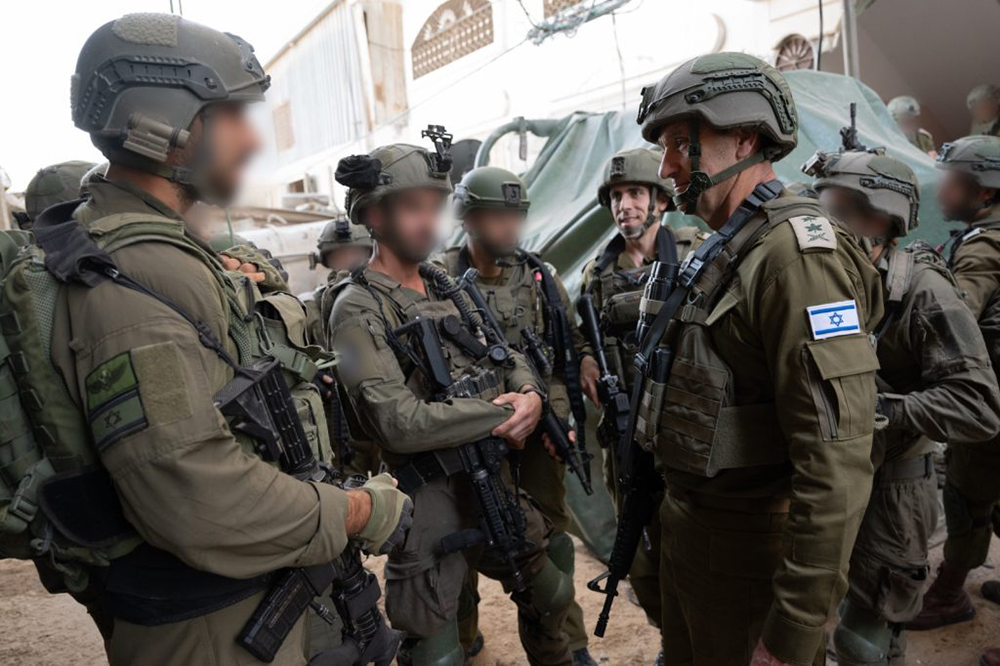|
Getting your Trinity Audio player ready...
|
Edited by: TJVNews.com
A recently uncovered document has disclosed that the Israeli Defense Forces (IDF) and intelligence agencies had detailed knowledge of Hamas’s plans to raid Israel and kidnap 250 individuals weeks before the deadly attack on October 7th, according to a report in The Jerusalem Post. The document, known to top intelligence officials, has brought to light significant gaps in Israel’s preparedness and response, prompting widespread criticism and calls for accountability.
The document, titled “Detailed End-to-End Raid Training,” was distributed on September 19, 2023, within the Gaza Division. As was reported by The JPost, it outlined Hamas’s meticulous preparations for the raid, including exercises conducted by elite units aimed at raiding military posts and kibbutzim (collective communities in Israel), kidnapping soldiers and civilians, and maintaining the hostages once they were brought into Gaza.
According to a report by Kan News, the document was known to the top echelons of Israeli intelligence, at least within the Gaza Division. “Security sources told Kan News that the document was known to the intelligence leadership,” the report stated, emphasizing the level of awareness among senior officials, as was noted by The JPost. The document’s detailed account of Hamas’s training and intentions starkly contrasts with the apparent lack of preventive action taken by the security establishment.

The revelations have sparked intense criticism of the IDF and intelligence services for their failure to act on the detailed information they possessed. The October 7th attack resulted in significant casualties and the kidnapping of numerous individuals, which many believe could have been prevented with timely and decisive action.
The IDF had precise intelligence about Hamas’s intentions, yet the prevailing conceptions within the security establishment and potential negligence by senior officials led to the warning signs being ignored, as per the information provided in The JPost report. The failure to act on this critical intelligence has been described as a major lapse in judgment and operational readiness.
Israeli intelligence officials not only had access to the document but also actively monitored and documented the exercises conducted by Hamas. Indicated in the JPost report was that these exercises included detailed plans for breaching Israeli territory, taking over military posts, and capturing between 200 and 250 hostages. Despite this surveillance and documentation, the anticipated attack unfolded with devastating consequences.
The surfaced document has significant implications for Israel’s security policy and intelligence operations. It underscores the need for a thorough review of intelligence protocols and decision-making processes within the IDF and related agencies. The incident highlights the critical importance of not only gathering intelligence but also acting upon it effectively to prevent such catastrophic events.
Yair Netanyahu, the 32-year-old son of Israeli Prime Minister Benjamin Netanyahu, on his X account, questioned whether the Israeli army and intelligence services are involved in a cover-up regarding their possible prior knowledge of the October 7th terror attacks, the deadliest in Israeli history.
The younger Netanyahu’s posts express deep suspicion about the recent Supreme Court decision to freeze a probe into the failures of the military and intelligence agencies on the day of the attacks, according to a report that appeared on Monday on the World Israel News web site. He wrote, “What are they trying to hide? If there was no treason, why are they so afraid for external and independent parties to check what happened?”
He further questioned why his father, Prime Minister Benjamin Netanyahu, was not informed about critical intelligence prior to the attacks. “To this day, no one has explained why they did not inform the Prime Minister about the conversation held the night before October 7th,” he continued, as was reported by WIN. He referred specifically to the “Walls of Jericho” intelligence report and queried why military and intelligence leaders maintained that Hamas was deterred.

Yair also raised concerns about the Air Force’s response on the day of the attacks, asking, “Where was the Air Force on 7.10?”
Yair expressed skepticism about the potential outcomes of any inquiry into the failures during the October 7th attacks. He suggested that a state investigation committee, typically chaired by a Supreme Court judge, would likely serve as a “cover-up committee for the Left,” as per the information provided in the WIN report. He implied that such investigations are inherently biased and designed to protect state institutions from accountability.
Earlier this week, Yair labeled the heads of Mossad and Shin Bet as “fatal failures” on his X account. WIN also reported that his history of provocative comments includes a 2020 incident where he confronted left-wing Kibbutzniks on social media, calling them “communists who stole half the country’s land.”
Yair’s allegations have sparked significant debate and concern. Critics argue that his statements could undermine public trust in Israel’s military and intelligence agencies, especially during a time of heightened security threats. Supporters, however, believe his questions highlight necessary scrutiny and accountability within these critical institutions. By questioning the actions and transparency of Israel’s military and intelligence services regarding the October 7th terror attacks, he has raised important issues about accountability and the flow of information within the Israeli government. As the situation develops, the responses from state institutions and the broader public will be closely watched, shaping the ongoing discourse about security and governance in Israel.
On Monday, the Tazpit Press Service (TPS) reported that Israel’s High Court of Justice has ordered State Comptroller Matanyahu Englman to suspend his investigation into the security failures surrounding the October 7th terror attacks pending a hearing in July. This decision has sparked considerable debate over the scope and authority of the State Comptroller’s mandate.
The State Comptroller, also known as the state ombudsman, is responsible for auditing Israeli preparedness and assessing the effectiveness of government policies. TPS reported that in the wake of the October 7th attacks, Englman launched a probe into the failures of the security services, aiming to scrutinize their preparedness and response.
Several government watchdog groups petitioned the High Court to halt Englman’s investigation. They argued that the security issues at hand were beyond the comptroller’s mandate and that the probe could potentially damage the operational effectiveness of the Israeli army, according to the information provided in the TPS report. Additionally, they contended that the investigation would fail to address the political responsibility for decisions made prior to the Hamas attacks on communities near the Gaza border.
In May, High Court Justice Gila Canfy-Steinitz ruled against stopping the State Comptroller’s probe. However, on Sunday, she reversed this decision, citing classified responses from security agencies that highlighted the potential risks of the investigation at this time. As was affirmed in the TPS report, Justice Canfy-Steinitz stated, “In view of the complex security reality, the planned scope of the investigation, which will deal, among other things, with the combat support system and core operational issues, and the preparation required to respond to it at the current time… I order the suspension of the investigation procedures in everything that relates to the IDF and Shin Bet.”
Englman’s investigation faced opposition not only from watchdog groups but also from key military and legal figures. Israel Defense Forces (IDF) Chief of Staff Lt. Gen. Herzi Halevi and the State Attorney’s office both expressed concerns about the probe. TPS reported that they argued that an in-depth investigation at this time could hinder the operational capabilities of the IDF and Shin Bet, potentially compromising national security.

In response to the catastrophic events of October 7th, the Israel Defense Forces (IDF) Chief of Staff, Lt.-Gen. Herzi Halevi, has initiated an internal investigation to examine the military’s failures on that day. The TPS report indicated that the probe, mandated by Halevi in February, is set to scrutinize various aspects of the IDF’s operational and intelligence performance during the attacks.
Lt.-Gen. Halevi’s internal investigation will focus on several critical areas. TPS reported that the probe will assess the actions and decisions of the General Staff, the body responsible for the overall command of the Israeli military. Another segment will investigate the failures within military intelligence that led to the unprecedented surprise attack. The deficiencies and breakdowns in the defenses along the Gaza border will also be a primary focus, as these were crucial in the early stages of the assault. The probe will also cover broader operational issues, evaluating how the IDF’s strategies and tactics were implemented and why they failed.
Importantly, the internal IDF investigation will not include an examination of the decisions made by the political echelon. As was indicated in the TPS report, this limitation has been a point of contention, as many believe that a comprehensive understanding of the failures requires scrutiny of both military and political decisions.
In addition to the IDF’s internal probe, a separate independent commission of inquiry with a broader mandate is anticipated to take place after the war, the TPS report said. This commission will have the authority to investigate political failures alongside military shortcomings. Such commissions typically have extensive powers to summon witnesses, collect evidence, and are usually led by a senior Supreme Court justice.
The attacks carried out by Hamas on October 7th were the deadliest in Israel’s history. The assailants targeted communities near the Gaza border, resulting in the savage murder of at least 1,200 people. Additionally, 252 Israelis and foreigners were taken hostage, with more than 30 of the 116 remaining hostages now believed to be dead, according to the information contained in the TPS report. The scale and brutality of the attacks have left an indelible mark on the nation, prompting calls for thorough investigations and accountability at all levels.
In related news, it was reported on Tuesday in The Algemeiner that amid increasing tensions and cross-border violence between Israel and Lebanon’s Hezbollah, the United States is intensifying diplomatic efforts to prevent the conflict from spiraling into a broader war. U.S. envoy Amos Hochstein, special envoy to President Joe Biden, emphasized the urgency of these efforts following his recent visits to both Israel and Lebanon.
For the past eight months, Israel and Hezbollah, the Iran-backed Lebanese terror group, have been engaged in intermittent hostilities along Lebanon’s southern border, as was noted in The Algemeiner report. This escalation runs parallel to the ongoing conflict in Gaza. Recently, Hezbollah launched its largest volleys of rockets and drones at Israeli military targets, responding to an Israeli strike that killed one of its senior commanders.
Hochstein was dispatched to Lebanon immediately after a brief visit to Israel, highlighting the gravity of the situation. “We have seen an escalation over the last few weeks. And what President Biden wants to do is avoid a further escalation to a greater war,” Hochstein stated on Tuesday, according to the information provided in The Algemeiner report.
During his visit, Hochstein met with key Lebanese figures, including the head of Lebanon’s army and parliament speaker Nabih Berri, who also leads the Amal movement, as per The Algemeiner report. Amal is allied with Hezbollah and has participated in recent rocket attacks on Israel.
The U.S. is not alone in its diplomatic endeavors. France is also actively engaged in seeking a negotiated end to the hostilities along the Lebanon-Israel border. The joint efforts aim to de-escalate the situation and establish a ceasefire. However, Hezbollah has made it clear that it will not cease its attacks unless a ceasefire is achieved in Gaza.
The cross-border violence has significantly intensified, with Hezbollah’s recent rocket and drone attacks marking the highest level of hostilities to date, as was explained in The Algemeiner report. This surge in violence underscores the volatility of the region and the potential for a wider conflict that could draw in additional parties and destabilize the broader Middle East.
The primary challenge in the diplomatic efforts lies in aligning the interests of the various stakeholders involved. Hezbollah’s stance, conditioned on a ceasefire in Gaza, complicates the situation, as it ties the resolution of one conflict directly to another, The Algemeiner report pointed out. Additionally, the intricate political dynamics within Lebanon, where Hezbollah holds significant influence, further complicate the path to a peaceful resolution.
The situation has been particularly volatile, with an increase in attacks last week. However, a brief respite occurred during the Eid al-Adha Muslim holiday, which ended on Tuesday. The Algemeiner reported that despite the temporary lull, Hezbollah resumed its attacks, announcing a drone strike against an Israeli tank on Tuesday afternoon, the first since Saturday.
Hezbollah’s recent actions have included using a more extensive arsenal against Israel, prompting warnings from United Nations officials in Lebanon. Over the weekend, UN officials cautioned that the “danger of miscalculation leading to a sudden and wider conflict is very real.”
UN Human Rights Chief Volker Turk expressed concern about the escalating violence. On Tuesday, he called for an immediate cessation of hostilities and urged influential actors to take all possible measures to prevent a full-scale war, according to The Algemeiner report. Turk’s comments reflect the international community’s anxiety over the potential for broader conflict in the region.
Hochstein’s push for a ceasefire in Gaza and the broader region is part of a strategic effort to stabilize the area. The proposal aims to reduce hostilities along the Blue Line and prevent the situation from deteriorating further.





